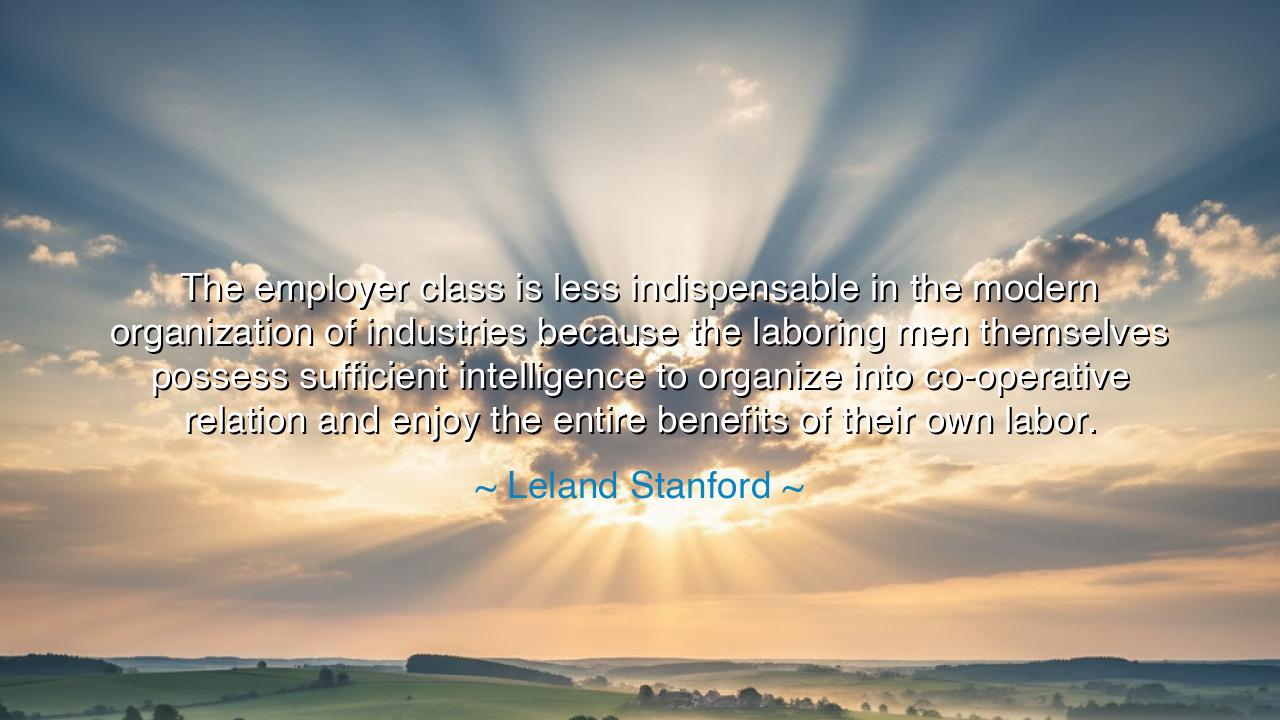
The employer class is less indispensable in the modern
The employer class is less indispensable in the modern organization of industries because the laboring men themselves possess sufficient intelligence to organize into co-operative relation and enjoy the entire benefits of their own labor.






When Leland Stanford, the industrial titan and visionary founder of Stanford University, declared, “The employer class is less indispensable in the modern organization of industries because the laboring men themselves possess sufficient intelligence to organize into co-operative relation and enjoy the entire benefits of their own labor,” he spoke with the voice of a man who had glimpsed the turning tide of human destiny. His words rose not from idle sentiment, but from deep contemplation of a world transforming under the power of industry, education, and the awakening of the working class. In his time—the late nineteenth century—the old hierarchies of master and servant were being shaken by new forces of invention, progress, and social consciousness. And in that upheaval, Stanford discerned a truth that still reverberates through the ages: that intelligence and cooperation could one day liberate labor from the domination of capital.
To the ancients, this idea would have sounded revolutionary yet familiar. For in the mythic ages, before kings and employers, there were guilds of craftsmen, bands of farmers, and brotherhoods of artisans who worked together, not for the enrichment of one, but for the sustenance of all. Stanford’s insight echoes that ancient order—the belief that work, guided by wisdom and unity, needs no master. In his age of railroads and steel, he saw that the worker was no longer the dull hand of labor that capital presumed him to be, but a man awakening to self-knowledge, capable of building, managing, and prospering through cooperation rather than subjugation.
Leland Stanford himself was a paradox—a railroad magnate who preached equality, an industrialist who dreamt of democracy in labor. Yet it was precisely this paradox that gave depth to his words. He had seen the power of organization, not only in the boardrooms of tycoons but also in the sweat and strength of workers who built empires of iron. He believed that, with education and moral development, these same workers could govern the industries they served. His founding of Stanford University was part of this vision—a temple of learning meant to uplift the intelligence of ordinary men and women, so that they might become architects of their own destiny, not servants of another’s profit.
We can see the living spirit of Stanford’s prophecy in the rise of cooperatives, both in his era and beyond. Consider the Rochdale Pioneers of nineteenth-century England—a small group of weavers and tradesmen who, oppressed by low wages and high prices, pooled their meager savings to open a cooperative store. Their success ignited a movement that spread across nations. Through honesty, self-governance, and shared purpose, they proved that workers could indeed “organize into co-operative relation” and manage enterprise without masters. Their triumph was not merely economic—it was spiritual. It proclaimed that dignity, not dependence, is the rightful inheritance of labor.
And yet, Stanford’s vision remains unfinished. His words remind us that while humanity has advanced in skill and technology, the moral progress he envisioned—the unity and mutual respect between labor and leadership—still awaits fulfillment. The modern world continues to wrestle with inequality, exploitation, and the alienation of the worker from his work. The machines have grown intelligent, but the structures of power often have not. The intelligence of the laboring man, which Stanford praised, is too often stifled by systems that prize profit over purpose.
The lesson that emerges from his quote is timeless: those who labor possess the power to lead. Each generation must remember that intelligence is not the privilege of the few, but the birthright of all. The mind that can till the soil or build a bridge can also plan, organize, and govern. The future belongs not to those who command by wealth, but to those who cooperate by wisdom. The dream of self-organized labor—of communities that create and share in their own prosperity—is not a utopia; it is the natural flowering of human potential once freed from fear and ignorance.
Therefore, let this teaching be carried forward: educate the worker, and you emancipate mankind. Encourage cooperation, and you restore balance to the world of industry. The employer class, as Stanford foresaw, need not vanish in anger—it may transform into partnership, as the few and the many join in shared purpose. For when all men recognize the divine intelligence in one another, when labor and leadership become one in spirit, then the age of exploitation will end, and a new age will dawn—the age where humanity itself becomes both the builder and the beneficiary of its own labor.






AAdministratorAdministrator
Welcome, honored guests. Please leave a comment, we will respond soon